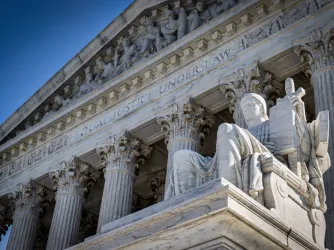Table of Contents
ARRESTED FOR JOURNALISM: Ohio newspaper editor hit with bogus ‘wiretapping’ charge and seizure of phone and laptop after publishing trial recording

Doral Chenoweth / The Columbus Dispatch / USA TODAY NETWORK
Derek Myers of the Scioto Valley Guardian is escorted out of the courtroom after "objecting" from the gallery on Friday, Oct. 14, 2022 during the George Wagner IV murder trial in Pike County. Myers was making a point that witnesses can't simply "opt out" of being photographed and videotaped when testifying. The judge disagreed.
Derek Myers leads a small newspaper, the Scioto Valley Guardian, serving southern Ohio. After he recently published on the newspaper’s website audio of in-court testimony that someone else recorded in violation of a court order, local police arrested him, seized his electronic devices, and charged him with felony wiretapping — all in violation of the First Amendment, federal law, and state law.
In 2016, Jake Wagner participated in a massacre that left eight dead. As part of a plea agreement, Jake is now testifying against his brother, George Wagner IV, who is charged with murder. Pursuant to an Ohio court rule requiring that the court “shall permit” the broadcasting of trials, Myers’ Scioto Valley Guardian has livestreamed much of the Wagner trial. But the court gave witnesses the ability to “opt out” of being recorded, meaning that witnesses could prevent their testimony from being streamed or recorded. After Jake Wagner elected to do so, Myers and other media outlets challenged the order, which an appellate court effectively left in place.
On Oct. 28, the Guardian published ten minutes of audio — recorded by someone else in violation of the court order — of Jake Wagner’s in-court testimony, with this note:
The Guardian received a portion of Jake Wagner’s testimony on his first day on the witness stand. The Guardian wants to disclose that the audio was not recorded by a member of the media and was submitted to the Guardian’s newsroom by a courthouse source who is authorized to have their cell phone in the room.
Myers was arrested on Nov. 1 pursuant to a warrant obtained by Sgt. Joshua Carver of the Pike County sheriff’s office. That same day, Sgt. Carver seized Myers’ laptop from a room at the courthouse used by journalists reporting on the trial.
The following day, when Myers entered the courthouse, a sheriff’s deputy claimed his cell phone was banned from the courtroom, and when Myers pointed out that he was going to the journalists’ room — not the courtroom — the deputy responded that he had a warrant for the phone and seized it.
That seizure wasn’t supported by the warrant.
When Myers entered the courthouse, a sheriff’s deputy claimed his cell phone was banned from the courtroom.
FIRE obtained both the arrest warrant and search warrant. The search warrant, issued on Oct. 28, was good for only three days. That meant that it expired on Oct. 31 — before the Pike County sheriff’s office seized the laptop and phone. And the warrant authorized them to seize only a specific “MacBook Laptop” — identified by photograph in the warrant — not the phone.
But even if the search warrant had not expired, it was invalid from the get-go. As the Committee to Protect Journalists rightly pointed out in condemning the arrest and searches, the federal Privacy Protection Act and an Ohio state statute shield Myers from searches of journalistic “work product.” The federal law, in particular, prohibits law enforcement from effectuating any search or seizure of a journalist’s work product unless the journalist has committed a criminal offense other than “receipt, possession, communication, or withholding” the information or materials at issue.
And courts have made clear the First Amendment broadly protects the right to publish materials and information someone else obtained unlawfully, even if the journalist knew the source broke the law. In Bartnicki v. Vopper, the Supreme Court held that the First Amendment protected a radio commentator who broadcast a surreptitiously recorded phone call between union officials, who discussed the need to “blow off [the] front porches” of school board members opposed to a pay raise. Although the radio host allegedly knew the recording was unlawfully made or obtained — his source claimed the tape showed up in his mailbox — the First Amendment protected the broadcast.
This principle is important. If mere knowledge that materials were unlawfully obtained is enough to limit journalists’ publications, it would allow governments to make a broad range of documents and information confidential and then punish anyone outside the government who talks about it. That would make it harder for the public to learn about things their governments do not want them to know. This principle is why, for example, the Los Angeles Times was recently able to publish leaked audio recordings of city councilmembers making racist remarks, even though the source likely recorded the councilmembers unlawfully.
The Pike County sheriff’s office weaponized an expired warrant to hit a dubious trifecta: violating the Constitution, federal law, and state law, all in ways that transgress clearly established law.
So while Myers’ source may have broken the law, there’s no indication Myers did so. To the contrary, every indication shows the police had no reason to believe he made the recording. The arrest warrant alleges that Myers violated Ohio Revised Code § 2933.52(A)(3) because he “use[d]” — that is, published — an unlawful recording “knowing or having reason to know” the recording was unlawfully made. If police believed he had recorded or solicited the recording, they would have charged him under subsections (1) or (2) of the statute, which deal with “interception” or “procur[ing]” another person to make an unlawful recording.
But how could the police have known this search warrant was unsupported by probable cause, or that the search and arrest were unlawful? Simple. In addition to federal and state laws protecting Myers, the Supreme Court invalidated an identical statute in Bartnicki (and the dissent specifically listed this statute, right down to subsection (A)(3), as one of those affected by the Court’s decision).
That means that the Pike County sheriff’s office weaponized an expired warrant to hit a dubious trifecta: violating the Constitution, federal law, and state law, all in ways that transgress clearly established law. Yet, they still haven’t returned the laptop or phone, and Myers is still charged with a felony.
Does the First Amendment — or the law generally — mean anything in Pike County?
FIRE defends the rights of students and faculty members — no matter their views — at public and private universities and colleges in the United States. If you are a student or a faculty member facing investigation or punishment for your speech, submit your case to FIRE today. If you’re faculty member at a public college or university, call the Faculty Legal Defense Fund 24-hour hotline at 254-500-FLDF (3533). If you’re a college journalist facing censorship or a media law question, call the Student Press Freedom Initiative 24-hour hotline at 717-734-SPFI (7734).
Recent Articles
Get the latest free speech news and analysis from FIRE.

The federal charges against Don Lemon raise serious concerns for press freedom

The American people fact-checked their government

California prohibits its teachers from talking about a student's gender identity to their parents. That raises First Amendment concerns.


